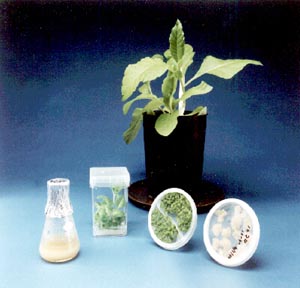Blood from plants
|

|
Plants offer a
safe, cost effective and unlimited
supply of human blood proteins.
Photo
courtesy of Pacific Northwest National Laboratory |
Plants have been used in medical treatments throughout human
history, but researchers have been looking to the world of biotechnology for new solutions to lingering medical
conditions. One such solution is a human blood protein now being cultivated in a
genetically-modified tobacco plant.
Researchers at the Department of Energy's Pacific Northwest National Laboratory are taking a new approach to plants as pharmaceutical
components. They are genetically modifying plants to produce human blood proteins and tissue growth
agents.
These blood-clotting agents could lead to safer and less expensive treatments for hemophiliacs and an alternative way of sealing
wounds. Pacific Northwest researchers have produced two blood factors that are used to treat most patients with blood clotting
disorders.
Researchers are synthesizing human coagulation factor VIII, an ingredient in human blood that helps stop
bleeding. Consequently, it's a much-needed protein for people with hemophilia and other
blood-clotting disorders.
These factors currently are made from human blood plasma or by painstakingly cultivating mammalian
cells. But treatments derived from human or animal components can be risky. For
instance, about 80 percent of hemophiliacs over the age of 10 were infected with HIV from receiving blood products prior to the development of screening
programs.
Even with screening programs some viral products such as
HIV, Epstein-Barr, Hepatitis B and C and even the flu, can be transferred in blood
products. Using plants to produce human blood proteins eliminates the possibility of transmitting disease along with lifesaving
treatments.
"In addition to the obvious health
benefits, we expect the cost of synthesizing blood factors in transgenic or genetically modified plants to be 10 times cheaper than current
methods," said Brian Hooker, a biochemical engineer at Pacific Northwest.
"And, unlike human blood donors or mammalian cells, plants provide a stable production source and yield much higher amounts of the desired blood
factors."
Dr. Brian Hooker is the man who's been working on cultivating the factor VIII
protein. He does this by putting the factor eight gene into what's called an agrobacterium - a solution that allows genes to be transfered to
plants. The genes carry a kind of blueprint which instructs an organism on how to create the
protein.
"We'll take what's called a leaf disc from tobacco, and then we'll take a very dilute solution of the agrobacterium and we cultivate the agrobacterium with the tobacco leaf
discs."
After three or four days in solution, the discs become infused with the factor eight
gene. They can then be removed and cultivated.
"We'll place these in a petri dish containing a nutrient medium and wait for a period of over two to four weeks and we'll see individual roots start to form on these leaf
discs, individual shoots form on these leaf discs, and eventually we can scale that up into a full
genetically-modified tobacco plant."
The final step in obtaining factor eight from the plant is grinding up the tobacco leaves and extracting the juices which contain the protein in
solution.
Using genetic engineering
technology, Pacific Northwest researchers are transplanting applicable human genes into tobacco plants and producing blood
factors. Patents are pending on the production and composition of plant-derived human blood coagulation
factors. Pacific Northwest researchers have produced coagulation factor VIII, which is critical to hemophilia
therapies, as well as factor XIII and a substance called thrombin which are clotting enzymes that aid in healing wounds and offer an alternative to sutures and other surgical
sealants.
Pacific Northwest has funded this research to date but is interested in teaming with pharmaceutical partners to commercialize the blood factor technology and other
plant-based pharmaceutical products. Commercialization manager Daniel Anderson says it likely will be several years before the blood products will be available for
humans.
|
